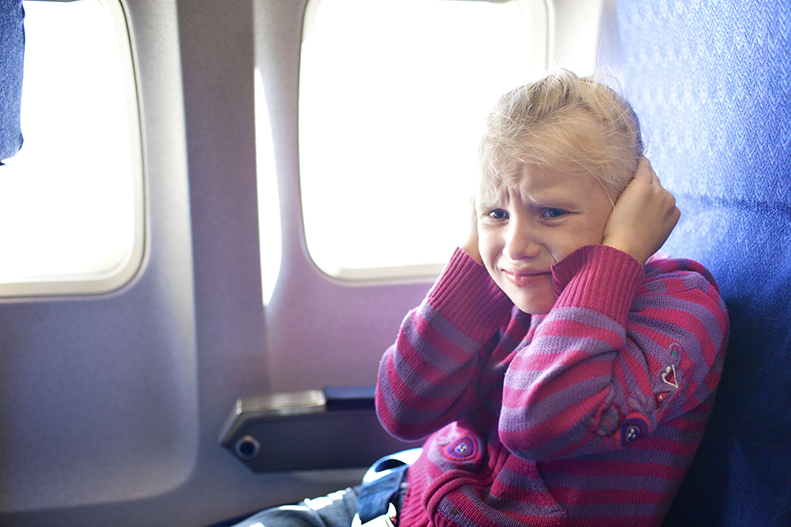You have been enjoying your summer by traveling to all of your favorite attractions. However, for some reason your long flight seems to have left you with a headache, or that scuba diving journey you took at the resort left your ears feeling stuffed. Unfortunately, you could have barotrauma. Barotrauma refers to the pain or discomfort that you feel when there is a difference in air pressure between the outside environment and the inside of your body.
There are several risk factors that increase your chances of developing barotrauma, including things such as:
- Smoking
- Obstructions in the ear
- Holding your breath while diving
- Dehydration
- Obesity
- Congested nose from allergies or colds
RELATED: Hydration 101: What You Need to Know
Never Miss a Beat!
Subscribe to Our HealthBeat Newsletter!
Thank you for subscribing!
You can now select the specific newsletters you'd like to receive.
You are already subscribed.
Subscribe to more newsletters in our email preference center.
Sorry, an error occurred. Please try again later.
Get Healthy Tips Sent to Your Phone!
Ear Barotrauma
Ear barotrauma most commonly affects the middle ear, which has a pocket of air that is sensitive to changes in air pressure. Your ears can begin to hurt due to a change in altitude. This can happen if you are flying in an airplane, driving in the mountains, or even scuba diving.
Common symptoms of ear barotrauma include:
- Pain in your ears
- A feeling that your ears are stuffed
- Temporary hearing loss
- Dizziness
- Bleeding from the ear (rare)
Medications such as decongestants can help with these symptoms. However, you can relieve pressure on your own by sucking on candy, chewing gum, yawning, or inhaling and gently exhaling through your nose while pinching your nostrils shut. These tools relieve pressure by forcing air through the blocked tube and can possibly open it.
Contact your doctor if symptoms do not go away in a few hours, or if the barotrauma is severe.
Sinus Barotrauma
Sinuses are air-filled pockets in the bone around the nose. Sinus barotrauma occurs when there is a difference in pressure between the air in the sinuses and the pressure outside.
Common symptoms of sinus barotrauma include:
- Pain around your cheek bones or above your eyes
- Headaches
- Sinus pressure
- Tooth pain
- Nasal bleeding
- It may lead to a severe sinus infection if you are also experiencing a cold or nasal congestion
Medications, such as decongestants, can help relieve pain caused from sinus barotrauma. However, you may need to contact your doctor if you still have symptoms after a few hours.
RELATED: What Makes Your Nose Bleed?
Prevention
To prevent yourself from experiencing an uncomfortable vacation this summer try taking precautions before you travel to your favorite vacation spot. Listed below are some of the prevention tips to use when flying or scuba diving that can reduce your chances of getting barotrauma.
Flying
- Relieve pressure by chewing gum, yawning, sucking on candy, and breathing with your mouth open.
- Avoid sleeping while the plane is landing to make sure that you are swallowing enough.
- Take a decongestant pill or nasal spray before the flight.
- Do not let a baby sleep during descent. Have them suck on a bottle or pacifier.
- Get filtered ear plugs, which will slowly equalize the air pressure against your eardrum.
- If possible, postpone your flight if you have a cold or are feeling congested.
Scuba Diving
- Make sure you are in good health before diving.
- Be properly trained.
- After diving, avoid flying or going to a higher altitude for the next 24 hours.
- Don’t smoke.
- Exhale freely while coming back up to the surface.
- Never dive alone.
- Don’t dive beyond 130 feet.
- Know the location of the nearest recompression chamber.
Do you suffer from barotrauma? If you’re planning a vacation or if these symptoms have been triggered by a recent event, visit the UPMC Ear, Nose, and Throat website to schedule an appointment and learn more.
About Ear Nose and Throat
The experts in the UPMC Department of Otolaryngology treat a variety of ear, nose, and throat (ENT) conditions in both children and adults. Our team includes board-certified physicians and highly skilled speech-language pathologists and audiologists. We provide both surgical and nonsurgical treatment options. Our research and clinical trials help to advance care for our patients. Find an ENT expert near you.
